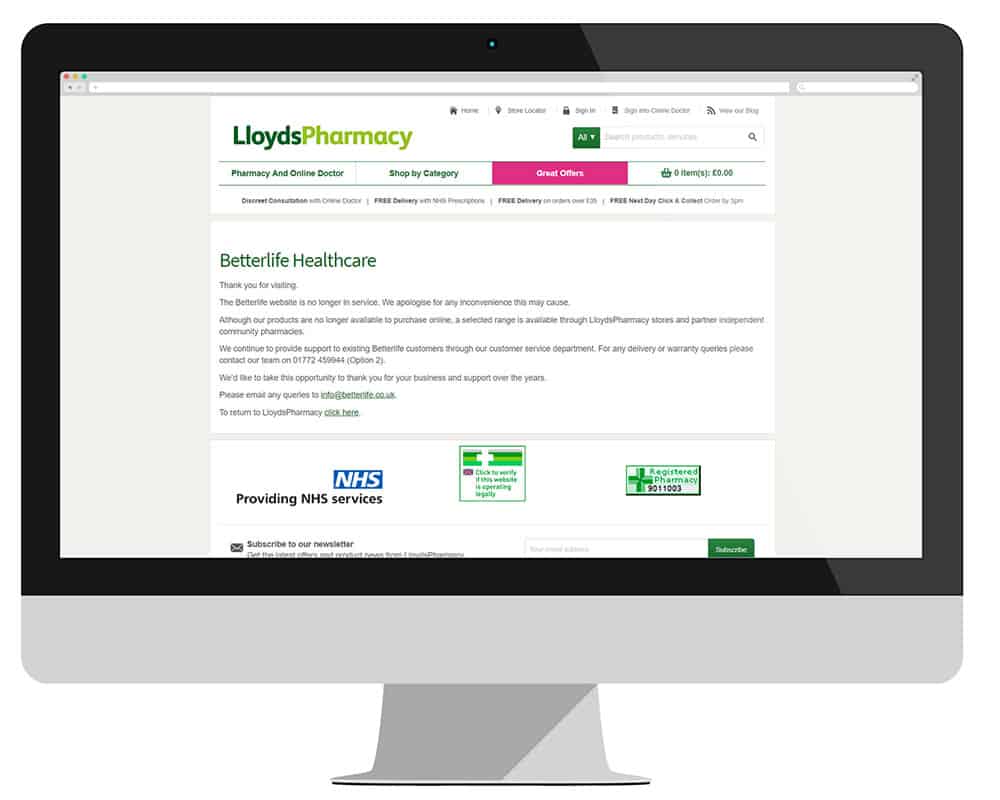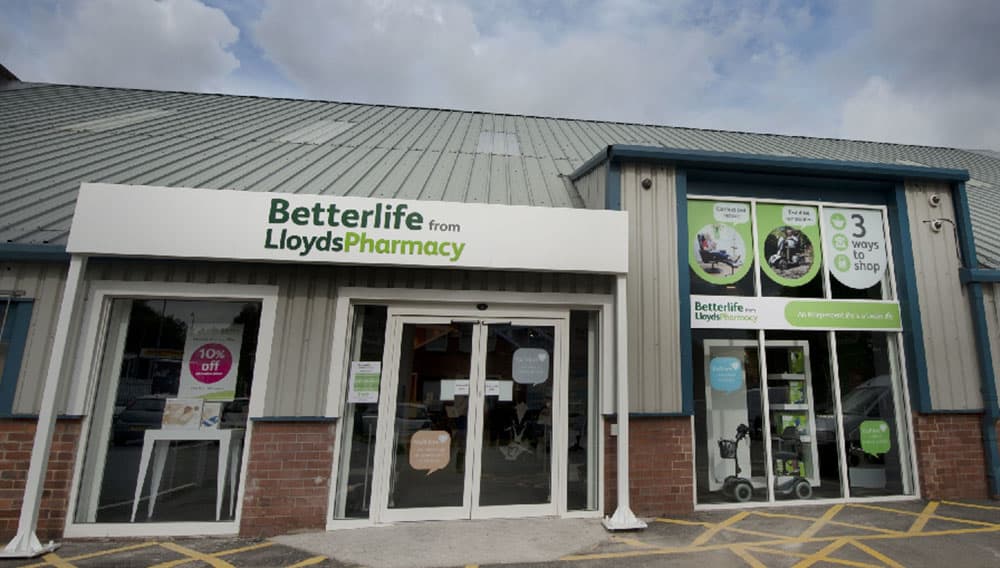Retailer Spotlight: Betterlife
The end of retail operations as we know it
In April 2019, Betterlife Healthcare, once one of the mobility industry largest and most dominant ecommerce retail players, announced it was closing its online and telesales retail operations and ending supplying “high ticket” items to customers’ homes, to the shock of the industry. With echoes of the fate of Simplyhealth’s retail proposition The Unlimited Company, THIIS investigates what this sudden change means for the Betterlife brand and for the industry as a whole.
The rise of Betterlife
Originally founded as an online retail proposition in 2014 by Grant Abrahams, former Head of Betterlife and present Retail Director of Drive DeVilbiss, Betterlife from LloydsPharmacy is an independent living and mobility equipment retail offering from its giant parent company McKesson UK.
After enjoying significant success online, Betterlife expanded into its own dedicated bricks and mortar retail space in the same year with its flagship store in Leeds.
Delivering a fresh and modern approach to mobility retail previously unseen in the industry, Betterlife’s Leeds retail space garnered praise and turned heads in the industry, with the shop being crowned ISG Store Design of the Year at the Oracle Retail Week Awards 2015.
The company quickly expanded its bricks and mortar presence soon afterwards, launching its second store two more dedicated stores in the West Midlands in March and October 2015, as well as Betterlife spaces in LloydsPharmacy outlets.
“The independent living aids market has experienced similar issues to the rest of the high street and it has become increasingly difficult to remain competitive” Claire Salmons
The company’s dedicated stores boasted an innovative design that featured a mobility scooter test track and unique, real-life home settings for people to imagine the products in their own home, pushing the lifestyle aspect of the products.
Over the years, Betterlife continued to grow across its multiple retail channels, particularly online, as well as introducing and selling its own branded range to mobility retailers and through its LloydPharmacy outlets.
From turning over £21.4million in 2015, with an operating profit on £317,000, the company flourished and by 2017, it had reached a turnover of £23.9million and an operating profit of £1.58million.
The decline of Betterlife
Despite its significant growth however, the environment Betterlife was operating in was evolving and becoming increasingly competitive, with online-only retailers cutting prices and impacting on margin.
By 2018, despite the company’s sales remaining steady, achieving £23.8m in turnover, the company’s operating profit plummeted to under £10,000.
In addition, 2018 saw the closure of the company’s vibrant retail spaces, with the flagship Leeds store closing in February, less than four years after opening the doors, swiftly followed by its spaces in the West Midlands.
Speaking to THIIS at the time, Sarah Jezard, Marketing Director at Betterlife, explained: “Whilst many people choose to buy from us online, it’s important to us to maintain an omni-channel presence so that people can touch and feel our products before they buy so our Betterlife products are available through the LloydsPharmacy network.”
The end of online and “big ticket” sales
With all dedicated Betterlife bricks and mortar stores closed, the company took the decision in April 2019 to end its online and telesales operations, instead selling through its LloydsPharmacy network, along with eliminating big ticket mobility devices such as mobility scooters and powerchairs from its product offering.
Discussing the motivation behind the move, Claire Salmons, Corporate Communications & PR Manager for McKesson UK told THIIS: “The independent living aids market has experienced similar issues to the rest of the high street and it has become increasingly difficult to remain competitive, particularly relating to the supply of high-ticket items into customers’ homes.
“We’ve therefore taken the decision to rationalise our Betterlife product range, remove mobility scooters and other large items and streamline the distribution so that we can use our own supply chain.”
The future of the Betterlife brand
Despite closing its telesales, online and bricks and mortar sales channels, the Betterlife brand will continue to live on, with the company emphasising that it will continue to sell selected products through its own LloydsPharmacy network and wholesale – albeit with a reduced range of products.
“We will still be stocking some Betterlife products in LloydsPharmacy stores and customers will be able to get these items from partner independent community pharmacies — but not online, or via our Telesales team,” stated Claire.
“The Betterlife brand will remain and we will continue to provide support to existing customers through our customer service channels.”
Thanking all customers for their ongoing support, Claire finished: “We will have a team in place to ensure all customer returns, warranty and repairs are managed in line with terms at time of purchase.”
Trade thoughts…
Citing the difficulty of remaining competitive in the market, particularly with the supply of big ticket items, THIIS asked various trade professionals for their thoughts on Betterlife’s assessment of the mobility industry…
Yvonne Malone, Managing Director of H&M Health and Mobility
“We do agree it is increasingly difficult to remain competitive in this market due to lower cost online sales. However, we remain competitive because we have the ability to MEET and SEE the customer whether at our premises or in their own home to assess each individual’s needs, unlike online retailers. Customers appreciate our caring and honest approach and our considerable knowledge of the market.”
Angus Long, Managing Director of Impression Marketing
“Commercial enterprises such as LloydsPharmacy and Simplyhealth saw the homecare market as a lucrative new venture and entered in a big way. However, in my view, they entered the industry with a supermarket mentality, with their principal focus on the bottom line. With greater buying power, squeezing suppliers, undercutting smaller competitors, exploiting showrooming and focusing principally on best price rather than most appropriate product, it was always going to be, on paper at least, an attractive business venture.
“However, in many cases, after initially buying the lower cost “star buy” of the day, elderly consumers ended up having to get something more suitable further down the line, ultimately making the purchase of their equipment more expensive than if they had initially used specialist homecare retailers that ensure customers are sold the most appropriate product for their needs, budgets and circumstances, as opposed to the most profitable product for their bottom line.”
Tim Mills, Head of Business at Motion Healthcare
“I think this is another example of how the ‘low margin, high volume’ model is simply not sustainable in our industry and the suppliers pushing this model are certainly going to feel the pinch of a major contributor to that volume not supplying it for them anymore.
“At Motion, we will continue to make our big-ticket items a success by not only bringing the right products to the market and being easy and enjoyable to do business with but by supporting the opposite model. We believe for a dealer to be able to invest in having stock to demo and support a customer correctly after the point of sale, they need to make a certain level of margin, so our pricing reflects that.
“As we have said from day one, we would like a network of dealers covering the whole country committed to us and our product range and in return, they will be able to make better margins so we are all less involved in the chase to the bottom that is a bi-product of other major suppliers needing such high volumes to make their model work.”
Alastair Gibbs, Managing Director of TPG DisableAids
“As a BHTA member and retailer of “high ticket items” ourselves, we have always taken the view that the physical nuts and bolts and plastic is only part of what we are offering to sell on the open market. The rest of what we sell is the knowledge, the assessment, the handover, the aftercare, and the long-term service which all has a value, even if a first-time buyer cannot see it.
“Obviously, it does mean that we will lose some deals to other companies that sell mainly on price. Online business invariably has very little else to offer other than a keen price, but there always seems to be someone who is prepared to go a little lower just to close the deal.
“In our opinion, this method of selling, in this market place, was always going to be a limited time offering unless the meagre profits were ploughed back in to create the infrastructure required to deliver on customer expectations.
“The online market for many commodities and products is very valid, however, not where potentially vulnerable customers need additional guidance on their needs and requirements before making the purchase.”
Mike Williams, Managing Director and Founder of Ableworld
“We have no doubt that we can regularly lose out to ‘irresponsible’ competitors who have no concerns selling over the internet or without a thorough assessment and it would be easy to give in, but for us, it’s about having an ethical, professional long-term approach – not about making as much money as quickly as possible. We believe this attitude to trading also puts us in good stead with the professionals.
“Often, large corporate businesses are only looking at the bottom line which makes it difficult to grow as a business, certainly on a nationwide level. As we have franchises/business owners around the country, it means we don’t lose sight of the end-user and can work closely with local charities and professionals.”




